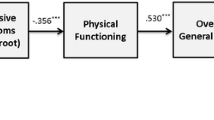Abstract
People living with HIV-AIDS experience emotional distress in response to negative changes in their health status. The current study hypothesized that individuals with poorer health literacy skills would evidence greater emotional distress in response to negative changes in health status compared to persons with higher health literacy skills. HIV positive persons (N = 294) completed anonymous surveys that included measures of depression and social support and a subset of 98 participants completed two experimental vignettes depicting a person receiving test results showing an increase in HIV viral load (negative health changes) followed by a vignette suggesting decreased viral load (improved health changes). Responses to affective reactions and coping strategies indicated that persons with lower health literacy skills more strongly endorsed negative affective states and maladaptive coping strategies compared to persons with higher health literacy skills. In addition, lower health literacy was associated with greater symptoms of affective depression and poorer social support, whereas higher literacy was associated with greater negativistic thinking. Findings suggest the need for patient education and counseling regarding changes in health status among people living with HIV-AIDS, particularly persons with limited health literacy skills.
Similar content being viewed by others
REFERENCES
American Medical Association. (1999). Health Literacy: Report of the Council on Scientific Affairs. JAMA, 281552-557.
Baker, D. W., Parker, R. M., Williams, M. V., Clark, W. S., & Nurss, J. (1997). The relationship of patient reading ability to self-reported health and use of health services. American Journal of Public Health, 871027-1030.
Baker, D. W., Parker, R. M., Williams, M. V., & Clark W. S. (1998). Health literacy and the risk of hospital admission. Journal of Internal Medicine, 13791-798.
Baker, D. W., Parker, R., Williams, M. (1996). The health care experience of patients with low-literacy. Archives of Family Medicine, 529-334.
Catz, S. L., Kalichman, S. C., Benotsch, E., Miller, J., & Suarez, T. Psychological Impact of Receiving Medical Feedback about HIV Treatment Outcomes: An Analogue Study of Affective Responses. Submitted for publication.
Doak, C. C., Doak, L. G., & Root, J. (1996). Teaching patients with low-literacy skills.Philadelphia: Lippincott.
Gazmararian, J., Baker, D. W., Williams, M., Parker, R., Scott, T., Green, D., Fehrenbacj, S., Ren, J., & Koplan, J. (1999). Health literacy among Medicare enrollees in a managed care organization, JAMA, 281545-551.
Hobfoll, S. E., (1989). Conservation of resources: a new attempt at conceptualizing stress. American Psychologist, 44513-524.
Ho, D. D. (1996). Therapy of HIV infections: Problems and prospects. Bulletin of the New York Academy of Medicine, 73(1), 37-45.
Houts, P. S., Bachrach, R., Witmer, J. T., Tringali, C. A., Bucher, J. A., & Localio, R. A. (1998). Using pictographs to enhance recall of spoken medical instructions. Patient Education and Counseling, 3583-88.
Kalichman, S. C. (1998). Understanding AIDS: Advances in Treatment and Research(2nd Ed.).American Psychological Association: Washington, D.C.
Kalichman, S. C., Catz, S., & Ramachandran, B. (1999). Barriers to HIV-AIDS Treatment and Treatment Adherence Among African-American Adults with Disadvantaged Education. Journal of the National Medical Association, 91439-446.
Kalichman, S. C., Ramachandran, B., & Catz, S. (1999). Adherence to Combination Antiretroviral Therapies in HIV Seropositive Men and Women of Health Low Literacy. Journal of General Internal Medicine, 14267-273.
Kessler, R. C., Foster, C., Joseph, J., Ostrow, D., Wortman, C., Phair, J., & Chmiel, J. (1991). Stressful life events and symptom onset in HIV infection, American Journal of Psychiatry, 148733-738.
Kessler, R. C., O'Brien, K., Joseph, J. G., Ostrow, D. G., Phair, J. P., Chmiel, J. S., Wortman, C. B., & Emmons, C. A. (1988). Effects of HIV infection, perceived health and clinical status on a cohort at risk for AIDS. Society of Science and Medicine, 27569-578.
Lazarus, R., & Folkman, S. (1984). Stress, Appraisal, and Coping.New York: Springer.
Morse, E. V., Simon, P. M., Coburn, M., Hyslop, N., Greenspan, D., & Balson, P. M. (1991). Determinants of subject compliance within an experimental anti-HIV drug protocol. Social Science and Medicine, 321161-1167.
National Literacy Act. (1991). 20 USC 1201.
Parker, R. M., Baker, D. W., Williams, M. V., & Nurss, J. R. (1995). The test of functional health literacy in adults: A new instrument for measuring patients' literacy skills. Journal of General Internal Medicine, 10537-541.
Ruehlman, L. S., Lanyon, R. I., & Karoly, P. (1999). Development and validation of the Multidimensional Health Profile. Part I: Psychosocial functioning. Psychological Assessment, 11166-176
Tabachnick, B. G., & Fidell, L S. (1989). Using Multivariate Statistics(2nd Ed). New York: Harper & Row.
Williams, M. V., Baker, D. W., Honig, E. G., Lee, T. M., & Nowlan, A. (1998). Inadequate literacy is a barrier to asthma knowledge and self-care. Clinical Investigations, 1141008-1015.
Williams, M. V., Baker, D. W., Parker, R. M., & Nurss, J. R. (1998). Relationship of functional health literacy to patients' knowledge of their chronic disease: A study of patients with hypertension and diabetes. Archives of Internal Medicine, 158166-172.
Williams, M. V., Parker, R. M., Baker, D. W., Parikh, N. S., Pitkin, K., Coates, W. C., & Nurss, J. R. (1995). Inadequate functional health literacy among patients at two public hospitals. JAMA, 2741677-1682.
Author information
Authors and Affiliations
Rights and permissions
About this article
Cite this article
Kalichman, S.C., Rompa, D. Emotional Reactions to Health Status Changes and Emotional Well-Being Among HIV-Positive Persons with Limited Reading Literacy. Journal of Clinical Psychology in Medical Settings 7, 203–211 (2000). https://doi.org/10.1023/A:1009528429865
Issue Date:
DOI: https://doi.org/10.1023/A:1009528429865




